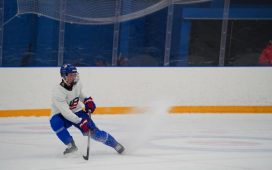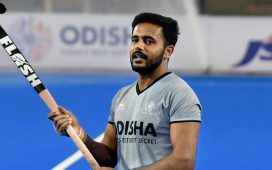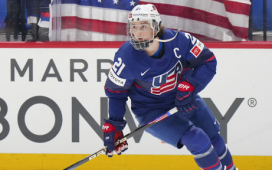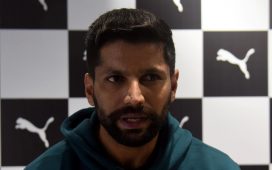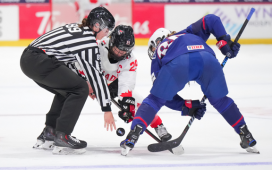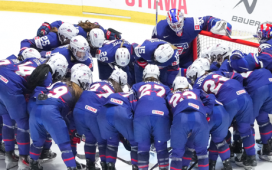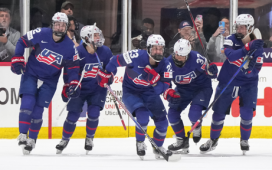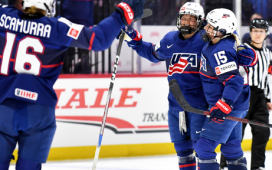It was a sleepy, sloppy play. It set the tone for Game 4.
New York Islanders left winger Anthony Beauvillier corralled the puck deep in the Florida Panthers’ zone, his back turned to goaltender Sergei Bobrovsky. For whatever reason, Bobrovsky was committed to the idea Beauvillier would pass. Instead, he hurled a surprise, no-look knuckler toward the net. It handcuffed Bobrovsky, who just wasn’t set.
“He was on the backhand, and in the middle there was a guy coming to the slot, so I didn’t expect that,” Bobrovsky said. “It was unlucky. The puck went over my stick and hit my skate. It’s one of those things where I just put myself in that position. If you would rewind that, I would do the same thing…it is what it is. Mistakes is mistakes. It’s a game of mistakes. You learn from it and move on.”
The Islanders never trailed after that first-period tally, mostly cruising to a 5-1 win in which Beauvillier added another goal and Mathew Barzal, in his best game of the series, sealed it on breakaway midway through the third period.
The first goal, the fluky play, encapsulated the Panthers’ season. Their expensive, typically elite goaltender couldn’t escape lapses in crucial moments. Their expensive, supposedly capable defense corps gave opponents too much space. The Panthers played pretty potent offensive hockey for much of the season, but it didn’t work against the Isles, whose collapsing style, allowing piles of attempts but blocking so many, smothered what was supposed to be Florida’s advantage in the series.
So the Panthers will leave the bubble. One could consider it a win that they got to play elimination games in 2019-20 for the first time since 2015-16, but the result was mostly disappointing considering (a) they shelled out $70 million over seven years for the two-time Vezina Trophy winner Bobrovsky; (b) they hired the second-winningest coach of all-time in Joel Quenneville; and (c) they fortified an already-talented lineup, led by Aleksander Barkov, Jonathan Huberdeau and Aaron Ekblad, with a pile of experienced depth additions, including Brett Connolly, Noel Acciari and Anton Stralman. The Panthers posted a .524 points percentage last season and improved to. 565, enough to put them in a “real” playoff position when the NHL shut down in March. The gains were incremental relative to the investment, however. And, apparently, ownership could not stomach that. Less than an hour after the series’ conclusion Friday, a report surfaced from Fox Sports’ Andy Strickland that the Panthers would be firing GM Dale Tallon.
So what will the next GM’s gameplan be? The Panthers’ deficiencies should be pretty obvious, but the solutions might not be.
We know the Panthers can score. They were the No. 6 offensive team in the NHL this season. We can give them a mulligan for a small sample size against the Isles and at least agree goals are not Florida’s problem. Huberdeau and Barkov are among the elite players in the sport at left wing and center, respectively. Ekblad made quiet strides on the offensive side of the puck this season, and Keith Yandle remains a good power-play quarterback. Florida has some exciting reinforcements coming, too. Russian left winger Grigori Denisenko will play in North America next season and looks like a game-changing power forward who could challenge for the Calder Trophy if he makes the team. Goal-scoring right winger Owen Tippett was very comfortable as an AHL rookie and should push for a top-nine role. Two-way pivot Henrik Borgstrom still has potential, too, despite struggling to break through as an NHL regular . The Panthers will need him after trading No. 2 pivot Vincent Trocheck, especially with Erik Haula, who came over in that deal, becoming a UFA.
The Panthers also boast two high-end wingers in Mike Hoffman and Evgenii Dadonov, of course. Or, they used to. Both are set to become UFAs. Considering they could combine to command $15 million or more in cap space, the Panthers may have to consider letting both go and hoping their youngsters are ready to contribute.
Why? After all, the Panthers have $20.96 million in cap space on paper, with no particularly pricey RFA to worry about. The most important is defenseman Mackenzie Weegar, who won’t be a bank breaker. Couldn’t they make competitive offers to keep Hoffman and/or Dadonov? Sure, but the money may have to go toward solving the Panthers’ primary roster problem: team defense.
The word is “defense” because there isn’t much to do about the goaltending right now. You can’t quit on Bobrovsky after one nightmare season. He’s fallen on hard times before in his career only to rededicate himself and emerge stronger than ever. He also chipped in some big saves in the series and felt he got better with each game.
“It was kind of a mixed feeling,” Bobrovsky said when asked to assess his whole season on a Zoom conference call following Game 4. “In the beginning it was very hard for me. At the end I started to feel better and better. I adjusted more, got more comfortable with the rhythm, with the whole surroundings, with the guys, with the team, with the coaches. For this short period I felt pretty good physically, mentally, and I think we made some strides as a team. This team, I don’t know (the last time) when they were in the playoffs, and to get that (one) win against the Islanders, to get that feeling, how it tastes, how it’s worth it, it brings us even more together. It’s a process. You can’t jump right away to the roof. You have to make some baby steps towards our goal. Still, there’s lots of talent in this room. We’re close, and we’re excited about our future.”
So Bobrovsky will get another chance, all $10 million of him. Besides, elite goaltending prospect Spencer Knight is still years away. The next step, then, is bringing in more help in front of ‘Bob.’ As a team, Florida surrendered the 11th-most shots per 60 minutes and seventh-most high danger-attempts per 60 this season, contributing to the league’s seventh-highest expected goals against per 60. It would thus help to get better at limiting the quality of chances Bobrovsky faces.
“You look at balance in our team: offense, defense – our team game’s got to be more without the puck,” Quenneville said on the Zoom call. “We’re playing hard with the puck. The consistency has got to be something we look to instill and take pride in not being scored on and not being in your own end. Check together – that’s something we’ve got to improve upon.”
So the next Panthers GM has to look at putting a stronger D-corps out there for Quenneville to work with. This summer offers some exciting UFAs to chase, most notably Alex Pietrangelo and Torey Krug, and it’s a deep group behind them. Yet Tallon had committed a lot of capital already to the blueline. Ekblad, Yandle, Mike Matheson, Stralman, Mark Pysyk and Weegar combined to chew up $28.56 million in cap space. So do you keep throwing money at the problem? The new GM may have to, as the salaries didn’t reflect the quality of the group. Matheson in particular was a huge disappointment, falling out of favor with Quenneville to the point of being tried at forward and being scratched during the play-in round for Games 3 and 4. He has six more seasons left at a $4.88-million AAV. His modified no-trade clause doesn’t kick in for another year, but his trade value couldn’t be lower right now. The Panthers will likely have to ride it out with him and hope he plays his way back into top-four status rather than becoming an expansion-draft candidate.
So does the new GM just swallow hard and shell out more money? Maybe, but, it’s not a given the Panthers spend like crazy this off-season. Ownership could feel nervous about committing a big chunk of change to another star after the Bobrovsky signing went so poorly this season. The Panthers also might not spend to the cap. Sportsnet’s Chris Johnston reported before the pause that ownership wanted to trim $10 million from the payroll this coming off-season.
Whatever the Panthers do, it’s a pretty safe bet we’ll see a different looking lineup take the ice in 2020-21. Don’t be surprised if the forward corps is a lot younger – and the defense has a new member added to its top four. At least the core players remaining will enter next year with some pseudo-playoff experience under their belts.
“It was good to get those couple games for our organization and team, and (now) everybody’s more experienced in that type of game,” Barkov said. “And I think the only way is up. I’m really excited about the future for our team and organization.”
Want more in-depth features, analysis and opinions delivered right to your mailbox?Subscribe to The Hockey News magazine.
